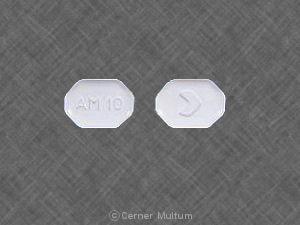What is Amlodipine?
 Amlodipine is in a group of drugs called calcium channel blockers. Amlodipine relaxes (widens) blood vessels and improves blood flow.
Amlodipine is in a group of drugs called calcium channel blockers. Amlodipine relaxes (widens) blood vessels and improves blood flow.
Amlodipine is used to treat high blood pressure (hypertension) or chest pain (angina).
Amlodipine may also be used for other purposes not listed in this medication guide.
What is the most important information I should know about Amlodipine?
Before taking amlodipine, tell your doctor if you have congestive heart failure or liver disease.
Avoid drinking alcohol while taking amlodipine. Alcohol can further lower your blood pressure and may increase some of the side effects of amlodipine.
If you are being treated for high blood pressure, keep using this medication even if you feel fine. You may need to use blood pressure medication for the rest of your life.
Amlodipine is only part of a complete program of treatment that may also include diet, exercise, weight control, and other medications. Follow your diet, medication, and exercise routines very closely.
Tell your doctor about all other heart or blood pressure medications you are taking.
Your chest pain may become worse when you first start taking amlodipine or when your dose is increased. Call your doctor if your chest pain is severe or ongoing.
What should I discuss with my healthcare provider before taking Amlodipine?
You should not take this medication if you are allergic to amlodipine.
If you have certain conditions, you may need a dose adjustment or special tests to safely use this medication. Before taking amlodipine, tell your doctor if you have:
- congestive heart failure; or
- liver disease
If you are also taking a beta-blocker drug (such as Blocadren, Corgard, Inderal, Normodyne, Tenormin, Toprol, Trandate, Zebeta, and others) do not suddenly stop using the beta-blocker without first talking to your doctor. You may need to use less and less before you stop the medication completely. Stopping a beta-blocker too quickly can cause serious heart problems that will not be prevented by amlodipine.
FDA pregnancy category C. Amlodipine may be harmful to an unborn baby. Tell your doctor if you are pregnant or plan to become pregnant during treatment.
It is not known whether amlodipine passes into breast milk or if it could harm a nursing baby. Do not use this medication without telling your doctor if you are breast-feeding a baby.
Amlodipine Side Effects
What are the possible side effects of Amlodipine?
Get emergency medical help if you have any of these signs of an allergic reaction: hives; difficulty breathing; swelling of your face, lips, tongue, or throat.
Call your doctor at once if you have a serious side effect such as:
- feeling like you might pass out
- swelling in your hands, ankles, or feet
- chest pain
- slow, fast, or pounding heartbeats
- easy bruising or bleeding, unusual weakness
- numbness, burning, pain, or tingly feeling; or
- jaundice (yellowing of your skin or eyes)
Less serious side effects may include:
- headache
- drowsiness, depression, nervousness
- dizziness, spinning sensation
- warmth or redness under your skin
- nausea, vomiting, stomach pain, loss of appetite
- diarrhea, constipation
- urinating more than usual
- sleep problems (insomnia)
- strange dreams
- mild skin rash or itching
- joint or muscle pain
- dry mouth, thirst, increased sweating; or
- weight changes
This is not a complete list of side effects and others may occur. Tell your doctor about any unusual or bothersome side effect. You may report side effects to FDA at 1-800-FDA-1088.
Amlodipine Interactions
What other drugs affect Amlodipine?
Tell your doctor about all other heart or blood pressure medications you are taking.
There may be other drugs that can interact with amlodipine. Tell your doctor about all your prescription and over-the-counter medications, vitamins, minerals, herbal products, and drugs prescribed by other doctors. Do not start a new medication without telling your doctor.
What should I avoid while taking Amlodipine?
Avoid getting up too fast from a sitting or lying position, or you may feel dizzy. Get up slowly and steady yourself to prevent a fall.
Avoid drinking alcohol while taking amlodipine. Alcohol can further lower your blood pressure and may increase some of the side effects of amlodipine.
Amlodipine Dosage
How should I take Amlodipine?
Take this medication exactly as prescribed by your doctor. Do not take it in larger amounts or for longer than recommended. Follow the directions on your prescription label.
Amlodipine is usually taken once daily. Your doctor may occasionally change your dose to make sure you get the best results from this medication.
Your chest pain may become worse when you first start taking amlodipine or when your dose is increased. Call your doctor if your chest pain is severe or ongoing.
Amlodipine is only part of a complete program of treatment that may also include diet, exercise, weight control, and other medications. Follow your diet, medication, and exercise routines very closely.
If you are being treated for high blood pressure, keep using this medication even if you feel fine. High blood pressure often has no symptoms, so you may not know when your blood pressure is high. You may need to use blood pressure medication for the rest of your life.
Store amlodipine at room temperature away from moisture, heat, and light.
What happens if I overdose on Amlodipine?
Seek emergency medical attention if you think you have taken too much of this medication.
Overdose symptoms may include warmth or tingly feeling, severe dizziness, and fainting.
What happens if I miss a dose of Amlodipine?
Take the missed dose as soon as you remember. If it is almost time for your next dose, wait until then to take the medicine and skip the missed dose. Do not take extra medicine to make up the missed dose.
Edited from everydayhealth.com
